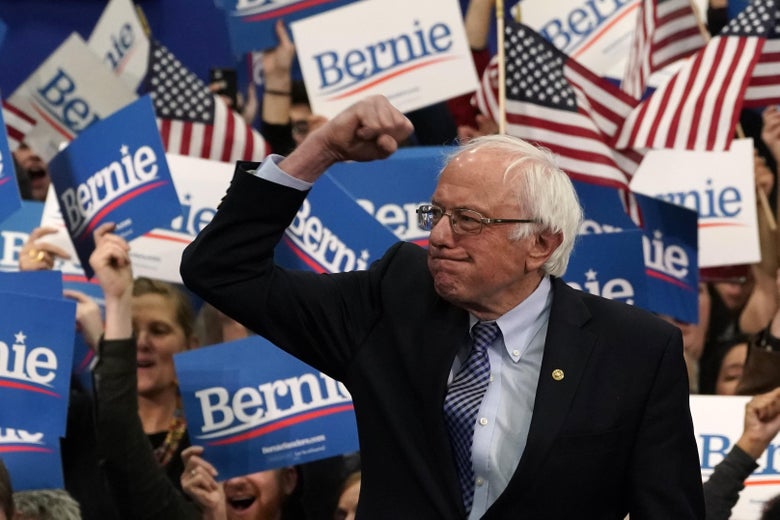
Bernie Sanders arrives to speak at a Primary Night event at the SNHU Field House in Manchester, New Hampshire on February 11, 2020.
TIMOTHY A. CLARY/Getty Images
Bernie Sanders won the New Hampshire Democratic presidential primary for the second cycle in a row Tuesday night, taking 26 percent of the vote to Pete Buttigieg’s 24 percent at the time of the call. Depending on which metric you use to judge the winner of the Iowa caucuses—or whether there is such a thing as a winner of the Apocalypse—Sanders can now claim victories in the first two nominating contests.
And given the way the rest of the field is shaping up behind him, the winning could continue for a long time.
If there was a surprise in Tuesday’s results, it was to confirm reports of Amy Klobuchar’s rise since Friday night’s debate, when she took a hard swipe at Pete Buttigieg. Klobuchar, who was at 11 percent in the final New Hampshire polling average, earned 20 percent for a strong third-place finish. Elizabeth Warren, meanwhile, sat in a distant fourth place with 9 percent, while a certain “Joe Biden,” known widely as the popular vice president to the popular, most recent Democratic president, sagged back in fifth with 8 percent.
One second-tier candidate, Andrew Yang, and one negligible candidate, Michael Bennet, dropped out as Tuesday’s results came in. But that was it. After two contests that exist, in large part, to winnow down the field of presidential candidates, the field hasn’t been trimmed in any meaningful way. The top five candidates from both Iowa and New Hampshire remain in the race, with other candidates preparing to compete with them in contests down the road.
Each of the candidates who lost to Sanders on Tuesday has reasons—or in some cases, excuses—to keep going. After claiming his first-place share in the chaos of Iowa and a definite second place in New Hampshire, Buttigieg is a made man who will have enough money to compete for as long as he’d like. Klobuchar’s surpassing of expectations in New Hampshire gives her reason to keep competing, too, as she tries to convert her breakthrough night into a national campaign. Elizabeth Warren still believes she’s best positioned to unite the party when more pieces fall into place; her campaign manager, Roger Lau, released a public memo Tuesday afternoon explaining why “Elizabeth Warren is the consensus choice of the widest coalition of Democrats in every corner of the country.” And though Joe Biden has sunk like a stone in the last week, he’s not expected to quit until at least the Feb. 29 primary in South Carolina, where he’s dominated polling since the beginning of the race on the strength of his support among older black voters.
It’s easier to stay, too, when every other candidate’s flaws are so obvious. With Klobuchar rising, Buttigieg can at least comfort himself in knowing that someone else’s lack of diversity among supporters will soon get the attention it deserves. Warren has finished third- and fourth-place in states that are tailor-made for her—the latter of which is a bedroom community for the state she represents in the Senate—and has seen Buttigieg eat her narrow base of college-educated liberals while Sanders has consolidated the left. Iowa and New Hampshire weren’t supposed to be Biden’s best states, but it’s hard to explain how a would-be consensus frontrunner could have finished fourth and fifth even in his unfavorable contests. He radiates weakness. And though Sanders has half-won Iowa and won New Hampshire, his margins have been anything but scary, giving his competitors reason to continue believing that his support has a hard ceiling.
But that’s the dilemma: The longer Sanders’ competitors all stay in to divide the vote, the less Sanders’ theoretically low ceiling will matter. Buttigieg, Klobuchar, and Biden together earned over 50 percent of the vote on Tuesday, but split it just neatly enough to give Sanders a narrow plurality victory. The same pattern could emerge in the Feb. 22 Nevada caucuses and South Carolina primary a week later, but with yet another actor waiting to divvy up the votes: the free-spending billionaire Tom Steyer, who will be a factor in Nevada and has recently been polling second in South Carolina. If the existing muddle that’s keeping everyone in the race stays intact through then—and why wouldn’t it?—it’s only three more days until Super Tuesday, when one-third of all pledged delegates are up for grabs. And Super Tuesday is when Michael Bloomberg, he of infinite money, begins competing.
Defeating Bernie Sanders for a presidential nomination is not an impossible task. There’s some very recent presidential primary data that supports this conclusion. But it’s considerably harder when five or six different people believe they should be the one to defeat him, and have their reasons for continuing on. In that case, modest plurality victories in early states can create their own momentum—and delegates—until suddenly, there’s no space left for an alternative. There’s some very recent presidential primary data that supports this pattern, too.
Readers like you make our work possible. Help us continue to provide the reporting, commentary and criticism you won’t find anywhere else.
Join Slate Plusfrom Slate Magazine https://ift.tt/2SiOl1v
via IFTTT
沒有留言:
張貼留言